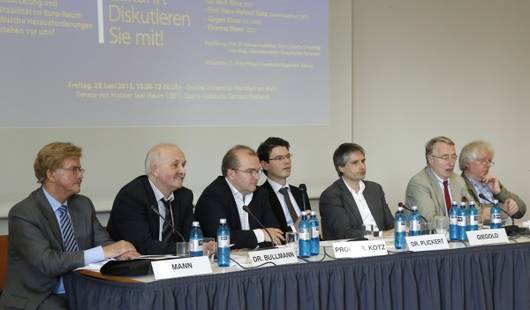On 28 June, five members of the European Parliament presented their views and answered questions from students and other interested visitors at the Casino Building on Goethe University’s Campus Westend. The event was co-organized by the SAFE Policy Center. Topic of the discussion was the economic development and stability in the Euro zone that challenges Europe especially with regard to the current crisis. Dr. Udo Bullmann (SPD), Sven Giegold (Bündnis 90/Die Grünen), Dr. Wolf Klinz (FDP), Jürgen Klute (DIE LINKE) and Thomas Mann (CDU) as well as Prof. Hans-Helmut Kotz (SAFE) were invited to the debate.
The discussion started with the conflict between austerity and growth. Mann stressed that consolidation was important but at the same time growth in the Euro zone should be promoted. Austerity alone was not the way out of the crisis. Bullmann agreed with Mann but criticized that the EU had prescribed the wrong treatment to crisis countries. Countries that had to be rescued by the EU now have higher debt than before. The demanded reforms inhibited growth. One reason was that there had been not enough productive investments. This had also contributed to high unemployment rates in the Euro zone.
Giegold added that there was a structural problem within the currency union in general. A lot of countries were in a recession which they had to combat with reforms on national levels. There was lack of support from compensation mechanisms at a European level, like for example a European unemployment insurance. Klinz agreed with Giegold but pointed out that member countries were not willing to implement a fiscal compensation at the moment. Klute referred to the situation in Greece as one example that needed a European solution. Greece’s debt should partly be reduced, but the demanded reforms and conditions also had to be reasonable for the population. The imbalances in Europe should not increase any further, he said.
A further problem that was discussed was the high youth unemployment and possible measures to combat it. Mann explained that there already had been some reforms in Europe such as the European youth guarantee and the European Social Fund. But Bullmann replied that the obligations of the youth guarantee to ensure that young persons are not unemployed for more than four months were not practically implemented in Europe and a mere policy of pretense. It was more important to support sustainable investments and activities of medium-sized companies because as long as the economy was in a recession no new jobs would be created. Furthermore, member countries would have to be obliged with corresponding incentives and sanctions to seriously fight unemployment.
The discussion with the audience that followed was among other things about current data which showed that households in South European countries were actually wealthier than households in Germany. Giegold said that some individuals in South Europe had become wealthy during the crisis and that this could explain the findings. This wealthy part of the population should now make a contribution to fighting the crisis by paying more taxes. Klinz replied that he did not see new taxes as necessary. First of all there should be a tax reform because the states lose about 500 billion Euros annually by tax fraud or optimization alone. If this problem were not seriously approached, citizens would on the other hand not be willing to pay new taxes.
The discussion was moderated by Dr. Philip Plickert, Frankfurter Allgemeine Zeitung. Apart from the SAFE Policy Center the discussion was co-hosted by the Information Office of the European Parliament in Germany.

From left: Thomas Mann, Dr. Udo Bullmann, Hans-Helmut Kotz, Philip Plickert, Sven Giegold, Dr. Wolf Klinz, Jürgen Klute

